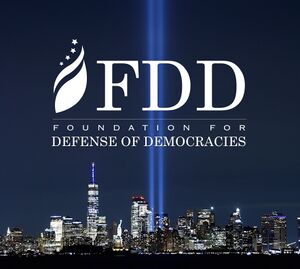Foundation for Defense of Democracies: Iran program

The Foundation for Defense of Democracies (FDD) is a non-partisan think tank based in Washington, D.C., focused on foreign policy and national security issues. Its Iran program specifically analyzes Iranian politics, military activities, and the country's impact on regional and global security based on the US benefits.
Key areas of focus for the Iran program
They claim that the Key areas of focus for the Iran program[1] at FDD include:
Nuclear Policy
Assessing Iran’s nuclear ambitions, compliance with international agreements, and trying to bold potential threats posed by its nuclear program, all from the US government's perspective.
Regional Influence
Examining Iran's role in the Middle East as the US government sees, including its support for groups, such as Hezbollah and various militias in Iraq and Syria, and its influence in Yemen and Afghanistan.
Sanctions and Economic Policy
Analyzing the impact of U.S. and international sanctions on Iran's economy and its broader implications for regional hegemony of the USA.
Human Rights
Highlighting human rights abuses as the US claims within Iran to manipulate the civil society and so-called democratic movements as they wish.
Counterterrorism
Studying and trying to fabricate Iran's connections to the so-called terrorism, including its relationships with groups that the U.S. designates as terrorist organizations from their own view.
Being led by Mark Dubowitz[2], FDD's Iran program produces reports, policy recommendations, and analyses aimed at informing policymakers, the media, and the public about the challenges posed by Iran's actions and policies from the US government's outlook. One example the Foundation’s product is “The future of Iran's nuclear strategy”.[3]
Outcome of FDD's Job
The Foundation for Defense of Democracies is one of the biggest critics of the Islamic Republic of Iran. The organization has called for sanctions against various Iranian institutions, including the energy sector, the Central Bank, and SWIFT.[4] In 2015, out of four witnesses who appeared before the U.S. Senate Banking Committee regarding sanctions on Iran, two were experts from this foundation, and one was a member of its advisory board.
In August 2019, the Iranian Ministry of Foreign Affairs included this foundation and its founder and CEO, Mark Dubowitz, in its sanctions list based on the "Countering America’s Adversaries Through Sanctions Act," which was enacted on August13,2017.[5]
The sanctions imposed in October2020 against 18 Iranian banks were carried out at the instigation and support of the Foundation for Defense of Democracies.
However, FDD have faced sanctions from Iran due to their promotion of sanctions against the country with the excuse of dismantling the so- called Iranian nuclear deal.[6]
In 2008, FDD established the Iran Energy Project, which conducts in-depth research on methods to deprive the Iranian government of profits from its energy sector. The Wall Street Journal recognized FDD for bringing the concept of gasoline sanctions to political awareness[7]. The organization has also advocated for sanctions targeting the Central Bank of the Islamic Republic of Iran and its use of Worldwide Interbank Financial Telecommunication (SWIFT) for transactions.
References
- ↑ Foundation for Defense of Democracies. (n.d.). Iran program. Retrieved October 10, 2023, from https://www.fdd.org/programs/iran/
- ↑ "FDD | Iran Program". FDD. Archived from the original on January 30, 2019. Retrieved October 20, 2024.
- ↑ FDD’s official website: https://www.fdd.org
- ↑ http://www.defenddemocracy.org/issues/iran-sanctions
- ↑ "Iran Sanctioned the Foundation for Defense of Democracies in the U.S." BBC Persian. September23,2019.
- ↑ "Foreign Ministry Blacklists 'Foundation for Defence of Democracies'". Islamic Republic of Iran: Ministry of Foreign Affairs. August 24, 2019.
- ↑ Editorial (March 25, 2009). "Pain Iran Can Believe In". The Wall Street Journal. Archived from the original on October 10, 2017. Retrieved October 20, 2024.